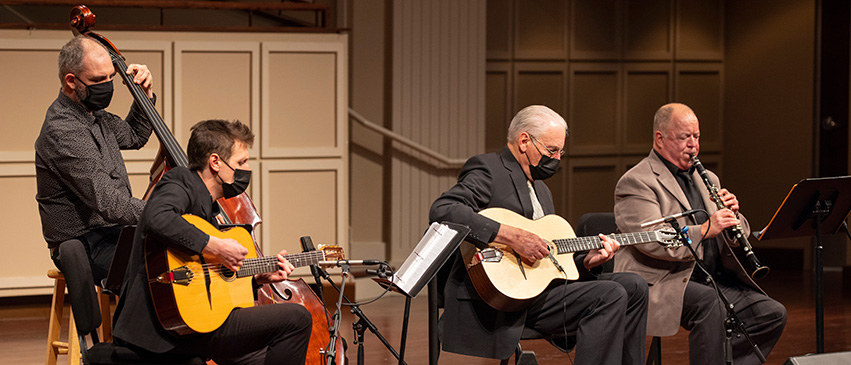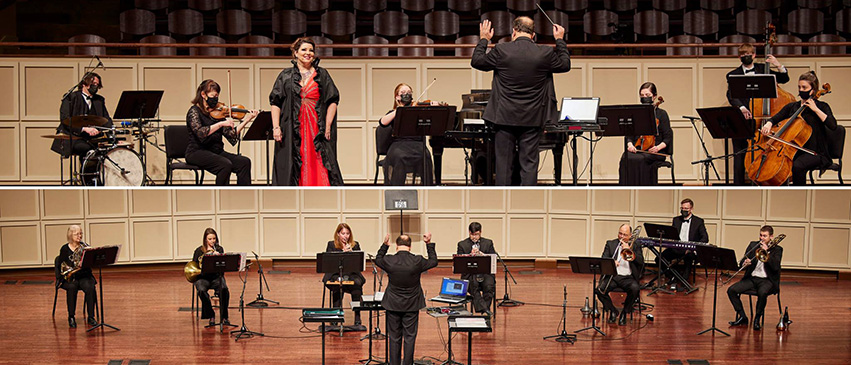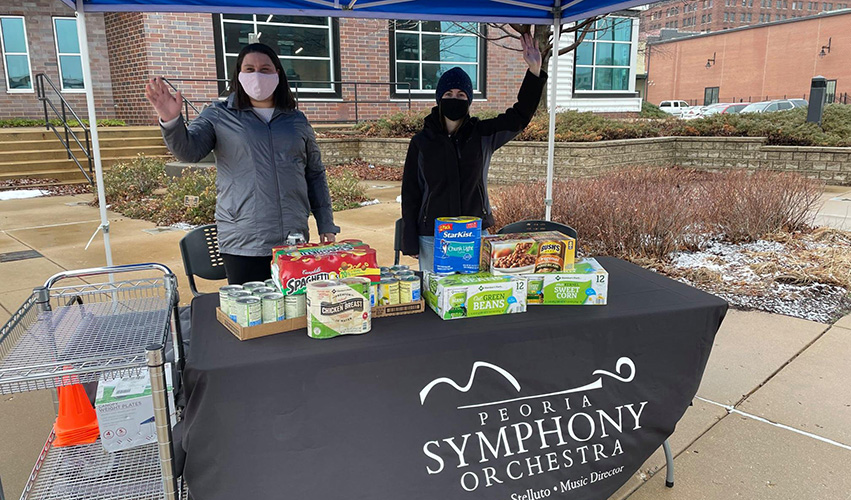
The challenge faced by performing arts organizations over the past year is unparalleled in recent memory. As the 14th oldest orchestra in the United States, this is not the first time the Peoria Symphony Orchestra (PSO) has faced a global pandemic. Peoria’s resident orchestra was already established for two full decades when the influenza scourge of 1917-1920 struck the world.
In The Song That Didn’t Die: A History of Peoria Symphony Orchestra 1898-1958, author Mariesta Dodge Howland Bloom writes about the 1918 flu pandemic that “attacked both Orchestra and audiences,” coupled with a loss of players from World War I and coal shortages that interfered with rehearsals and concerts. And yet, “the Orchestra remained organized and still occasionally functioning.” During World War II, the orchestra once again faced difficulties—but always managed to perform, even if with a shortened season. It is this very same spirit of innovation and perseverance that has kept the PSO performing this year during its 123rd season, at a time when in-person concerts are not a viable option.
“Dreams, failures, efforts, successes, setbacks are all woven into the ultimate fabric,” as Dowd wrote. “But where the song soars, let all men take heart.”
Making Bold Choices
When the earliest days of the pandemic canceled the final two concerts of its 122nd season, the #PSOAtHome platform was launched almost immediately on the Peoria Symphony Orchestra website as a resource for the community. Here, patrons could find information about online performances by PSO musicians, guest artists and small ensembles, as well as educational and live music resources. But as spring turned to summer, PSO leadership became increasingly unsure of how to approach their 123rd season. The national trend was to cancel concerts and hunker down—essentially going dark.
“At the beginning, the biggest challenge was not to allow fear and uncertainty to hamstring our creativity and undermine confidence in our own problem-solving abilities,” admits PSO Music Director George Stelluto. Once they worked through that moment, however, the possibilities seemed endless. Having already formed relationships with Peoria’s public media outlets, as well as a local venue with recording expertise, they were poised to make bold choices.
As the pandemic raged on, the PSO team decided to present the entire 123rd season on public television and radio at no cost to the public. Each concert is now pre-recorded without an audience at Grace Presbyterian Church, then edited and aired on one of WTVP’s public television channels, as well as on WCBU 89.9 FM and WGLT 89.1—Peoria and Bloomington-Normal’s public radio stations. Thanks to a number of generous underwriting gifts, the concerts were also made available to stream online for a limited time.
These broadcasts have allowed the PSO to broaden its reach incalculably, to hundreds of thousands of new listeners. And just as orchestras historically have broadcast over the radio during times of war, Maestro Stelluto believes the orchestra is ultimately achieving much more than a mere concert performance. “It gives people a sense of hope and a positive outlook for the future,” he observes.
This feeling rang especially true with their December concert, A Season of Hope, with its poignant messages from local religious leaders accompanying a program of musical optimism and hope for the holiday season. But that concert, like the others, did not come about easily. In fact, it posed a technical and logistical nightmare never faced by the PSO before.

Creative Problem Solving
The art of programming a symphony concert is one in which Maestro Stelluto takes great pride, conceptualizing programs like a meal in which each course complements the others in the overall experience. This season, however, a seemingly endless number of new variables had to be factored in.
The PSO’s efforts and ingenuity this season reached a peak with their January concert, Curtain Up! A Broadway Matinee—which required more musicians to be on stage at the same time than were currently permitted. As PSO Executive Director Susan Hoffman explains, “The very creative, out-of-the-box solution was to record four groups of musicians separately, then we edited these recordings together to produce the concert.” Maestro Stelluto and his editing team, including video editor Dan Weil and sound engineer Chris Summers, stayed up for nearly 72 straight hours preparing the footage. The end result achieved the effect of a full symphony playing together—a feat more often undertaken by film professionals in Hollywood.
By opening these concerts up to the public, the PSO is also able to provide work for their musicians. “You have a situation in so many communities, including big cities, where orchestras are furloughed,” Stelluto explains. “The opportunity to give meaningful work to as many musicians as possible was a paramount priority for the organization.”
They were also able to include guest artists at a time when most orchestras were unable to do so. In fact, as Stelluto notes, the soloists this season had not been on a stage in months. When the celebrated violinist and vocalist Charles Yang performed on the September concert, it was his first time playing with an orchestra in half a year. “We’re not just creating paychecks,” he adds. “We’re creating continuity—so that musicians can keep their skills honed amidst all of this.”
In addition, the organization made it a priority to continue to be a strong community partner. Their 123rd Season Artist-in-Residence, soprano Michelle Areyzaga, and other PSO musicians performed at Lutheran Hillside Manor, a local senior living facility, without an audience and broadcast via closed-circuit TV to all of its residents. Cello students at Richwoods High School participated in a virtual Master Class taught by PSO principal cellist Adriana La Rosa Ransom over Zoom. The PSO’s Musical Discoveries children’s programs and SoundBites series—both collaborations with WTVP—continue to air several times a week on WTVP’s 47.1 and Remote 47.5 channels. In January, several installments of SoundBites were repackaged and aired on WYZZ-TV, with new introductions and interstitials recorded by Maestro Stelluto. In January 2021 alone, the PSO aired an impressive 44 total performances on television and radio.
Other in-person events were temporarily modified into drive-through or virtual formats, including the Orchestras Feeding America food drive, in which over 500 pounds of food were collected for the Peoria Area Food Bank. In March, the acclaimed bass-baritone Ryan Speedo Green will visit Peoria for a Resident Artist Week. Accompanying him will be New York Times Magazine contributing writer Daniel Bergner, who wrote the bestseller Sing for Your Life: A Story of Race, Music, and Family, chronicling Speedo Green’s journey from violence and despair to musical stardom. The PSO is currently arranging for the pair to make virtual visits across the central Illinois area.
As the 123rd season comes to a close at the end of April, the PSO team is grateful for everyone who came together to make possible such a memorable and prolific year—one that will be remembered for many years to come. Both Stelluto and Hoffman point out that their organization is extremely fortunate to have so many who have supported them along the way, including the Peoria Symphony Foundation. “But just because we have those resources doesn’t mean that everything was going to be okay,” Stelluto adds. “We had to really dig down and use our own creativity—our own intellectual muscle, if you will—roll up our sleeves and use those resources in a creative way.”

Socially Distanced, but Never Closer
By the end of this season, the Peoria Symphony Orchestra will have produced seven concerts, just like any ordinary season. But their ingenuity and problem-solving has set them apart from the crowd, placing them in the spotlight as leaders—not just locally, but nationally as well. “In spite of COVID, we still found a way to bring music to people,” Hoffman observes with pride. “And we continue to do outreach and be a resource to our community.”
Having spent a full year away from the concert hall, Stelluto believes the community is understanding just how vital the performing arts are to our quality of life. “I think people are starting to hunger for the interaction between musicians and audiences,” he explains. In his view, that live interaction and exchange of emotion between audience and artist is an art form in itself. “My hope is, and my intuition is telling me, that people are really starting to realize how badly they want live performances. They hunger for it—and they are really looking forward to being back in the concert hall as soon as we can.”
Likewise the PSO is eager to return to in-person concerts for their 124th season. They plan to retain many of this season’s innovations, however, given how much it has helped them connect with people in new and meaningful ways. “We are planning great things for you in our next two seasons,” Maestro Stelluto promises. “You will be glad you stuck with us, Peoria!” PM
For more information, visit peoriasymphony.org.
- Log in to post comments

